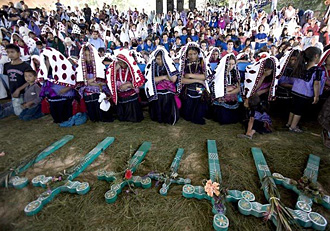 |
 |
 |
 Editorials | Issues | December 2007 Editorials | Issues | December 2007  
Ten Years Later, Massacre Still Haunts Mexico
 Marc Lacey - New York Times Marc Lacey - New York Times
go to original


| | Residents pray Saturday as they commemorate the 10th anniversary of the 1997 massacre of 45 Indians in Acteal, in Mexico's Chiapas state. (Eduardo Verdugo/AP) |
Acteal, Mexico — It was 10 years ago that gunmen crept down the hillside into this impoverished Indian village in Chiapas state. By the time they fled hours later, the attackers had littered the ground with bullet casings and killed 45 innocent people, including 21 women and 15 children.

Since the Acteal massacre, on Dec. 22, 1997, dozens have been arrested and convicted. But the case remains as foggy as the community, which is so high in the hills that clouds sometimes linger at ground level and the lush vegetation can disappear into the haze.

Then-President Ernesto Zedillo, reacting to international outrage over the killings, ordered an aggressive investigation. What prosecutors found was ugly: While local government officials and police officers had not wielded the weapons, they had allowed the slaughter to occur and tampered with the crime scene afterward.

The killers had been members of the then-ruling Institutional Revolutionary Party, or PRI. The victims were Roman Catholic advocates from a group called Las Abejas, or The Bees, who sympathized with the Zapatista rebels who were in open revolt in Chiapas.

All involved were poor Tzotzil Indians, many of them related.

A decade after the massacre, the Tzotzil live side by side but divided. In one group, the one that backs the PRI, many of the men have been sent to prison for the killings. The others, from the Abejas group, who live down the road, insist that even more killers are at large.

Meanwhile, Mexico's courts struggle to handle what has grown into one of the country's longest and most complex cases. A dozen judges have been involved in the trials and, now, the appeals of their convictions.

A year ago, the public-interest law clinic at Mexico City's Center for Investigation and Economic Studies began defending those convicted of taking part in the massacre. Lawyers say they have found that outrage over what happened to the innocents that day led to more abuses. They describe an effort to round up anyone, which sent many other innocent people to prison.

"The Acteal case shows all the problems of Mexico's criminal justice system," said Javier Angulo, who teaches constitutional law at the center and supervises students who are representing the Acteal defendants. "We solved the problem of the Acteal massacre by creating other problems and arresting people who did nothing at all."

The details of the case have been exaggerated and mythologized in so many ways, he said. The number of killers, which he puts at nine, has grown to hundreds in some people's estimation. Witnesses who in their first interviews could not name any of the attackers later gave authorities detailed lists of the men who fired the guns.

Advocates for the people who died at Acteal express fury at those who dare to defend the accused. "They tell so many lies," said Diego Perez Jimenez, president of the Abejas group, who is pushing for compensation for the families of the deceased. "These guys in jail were killers, and there are more killers out there. That's the truth."

One thing is clear: The long judicial process has done little to ease the tension in the hills. | 
 | |
 |



